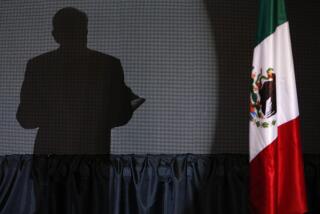Manuel Camacho Solis dies at 69; veteran Mexican politician quit ruling party
Manuel Camacho Solis, a veteran politician in Mexico who served as government negotiator with rebelling peasants in the 1990s and later turned against the ruling party, has died. He was 69.
Mexico City Mayor Miguel Angel Mancera announced Camacho’s death early Friday on Twitter. The cause was reported as brain cancer.
A senator since 2012 for the leftist Democratic Revolution Party (PRD), Camacho was praised for his negotiating skills and deft ability to carry out behind-the-scenes political maneuvering. A Times profile in 1994 described him as both “the black sheep of Mexican politics” and “his nation’s great conciliator.”
For decades he was a stalwart in the political party that ruled Mexico virtually unchallenged since 1930, the Institutional Revolutionary Party (PRI). He served in numerous leadership posts, including what was then the equivalent of the mayor of Mexico City in the late 1980s and early 1990s.
Camacho was seen as a right-hand man to President Carlos Salinas de Gortari (1988-94), both loyal and sharp. He expected to be appointed as Salinas’ successor; in those days the sitting president, always from the PRI, designated the candidate to replace him.
But in 1993, with elections approaching the next year, Salinas nominated a less-known protege, Luis Donaldo Colosio. Camacho was said to have been crushed and began to distance himself from Salinas and the PRI leadership.
In January of 1994, everything changed. Indigenous peasants in the southern Chiapas state, calling themselves the Zapatista National Liberation Army and led by a charismatic, pipe-smoking Mexican who identified himself as Subcomandante Marcos, staged a rebellion that challenged the status quo. The government dispatched the army, and dozens of people were killed.
Eager to rein in the rebellion, Salinas sent Camacho to Chiapas as a special peace envoy. Camacho and Bishop Samuel Ruiz, a Roman Catholic cleric respected by the guerrillas, negotiated with the rebels for months.
The talks raised Camacho’s profile nationwide, overshadowing Colosio’s presidential campaign. In March 1994, Colosio was assassinated at a campaign appearance. But Camacho was passed over again as the candidate when Salinas tapped Ernesto Zedillo.
The following year, Camacho finally split from the government and the PRI, forming his own leftist organization. It was a turbulent period marking the first major challenges to the PRI.
Writing in the Los Angeles Times opinion pages in 1994, political commentator Denise Dresser suggested that Camacho could shake up the stultified Mexican political system, but that he was “no beacon of democracy.”
“Camacho is a Mexican version of Japan’s Morihiro Hosokawa — a pragmatic tactician using a crisis and the attendant outcry for reform to further his political standing,” she wrote. “Like Hosokawa, he can be viewed as a modernizer but also as an opportunist, seeking to transform the political system so that he can lead it.”
Camacho ran for president, unsuccessfully, but helped shape what was until recently the major leftist party, the PRD. In 2000, the PRI’s hold on presidential power was finally shaken, although it would be a right-wing candidate, Vicente Fox of the National Action Party (PAN), who won the office.
In 2011-12, when it looked as though the PRI was about to make a comeback and return to the presidential palace, Camacho was again in his element, fighting to undercut the PRI’s success. He challenged the PRI’s time-honored practice of buying votes with gifts to constituents. He accused the party of overspending illegally and warned of a return of an unmodern party with autocratic tendencies.
The PRI’s Enrique Peña Nieto won election as president in 2012.
Information on Camacho’s survivors was not immediately available.
More to Read
Start your day right
Sign up for Essential California for the L.A. Times biggest news, features and recommendations in your inbox six days a week.
You may occasionally receive promotional content from the Los Angeles Times.








